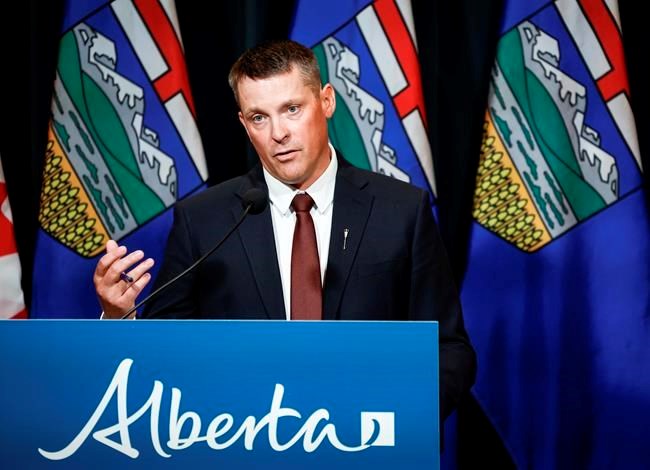Alberta Finance Minister Nate Horner says the government may have to lower how much it expects to take in from oil this year, but the overall budget outlook remains optimistic.
Premier Danielle Smith's United Conservative government introduced a spend-heavy budget in February that also promised a $2.4-billion surplus based on West Texas Intermediate — the North American benchmark price for oil — averaging US$79 a barrel.
The West Texas price is well under that prediction, currently trading at just under US$70 barrel.
Horner said while that is concerning, other factors are working in Alberta's favour, including the Canada-U. S. exchange rate, the differential between Canadian and U.S. oil prices and the continued diversification of Alberta’s economy.
"(The oil forecast) may have to come down," Horner told reporters in Calgary on Thursday after releasing the final figures for the 2022-23 budget year, which ended March 31. "We're not as worried as you may think.
"You're seeing right now the most diversified economy Alberta has ever seen. It's happening in tech, in agri-food investment, (and) film and television."
He said while the government continues to reduce its dependency on oil revenue and move toward a carbon-neutral economy, it will not abandon the fossil fuel industry.
"Alberta is well positioned," he said. "We'll be producing right to the end of oil's useful life. We'll be one of the last jurisdictions producing that last barrel."
Horner said more will become clear and communicated to Albertans at the end of August, when the numbers for the first quarter of the current budget year are assessed and released.
He also said he has not received his mandate letter from Smith on expected goals and priorities.
"Please be patient," he said.
Smith has promised the books will stay balanced, but that promise has become more complicated due to recent announcements and campaign promises.
During the election, Smith pledged to create a new tax bracket delivering about $760 more for everyone making more than $60,000 a year at an estimated cost of about $1 billion to the treasury.
The government has also extended its fuel-tax relief program until the end of the year. The province will continue not to collect its 13 cents a litre surcharge on gasoline, at an estimated cost of $520 million.
On top of that, Smith has promised legislation this fall committing the government to holding a binding referendum before hiking business or personal income taxes.
Horner acknowledged that minor changes in oil prices mean big swings in revenue, with every $1 change in the WTI equalling $630 million to the Alberta budget.
University of Calgary economics professor Trevor Tombe said the lower-than-budgeted oil prices present a big question for Alberta this year and next.
"A $9-per-barrel change is massive," he said.
"You combine that with the commitments in the election campaign to cut taxes and modestly increase spending, and we're looking at a pretty tight set of constraints on the government's room to manoeuvre this year and potentially in the future."
Horner announced Thursday that Alberta ended the 2022-23 budget year with an $11.6-billion surplus, up from its third-quarter estimate of $10.4 billion, due mainly to $25.2 billion from non-renewable resources.
The province said its strong financial situation allowed it to pay down $13.3 billion in debt. It also helped the Alberta Heritage Savings Trust Fund grow by $2.5 billion to $21.2 billion.
Revenues came in at $76.1 billion, which is $13.5 billion more than expected, due to $25.2 billion in non-renewable resource revenue and $26.5 billion from taxes. Corporate income taxes brought in $8.2 billion, double what was estimated in the 2022 budget and the highest on record.
The government spent $64.5 billion — $2.4 billion more than budgeted — on higher-than-expected health-care costs and affordability measures to help Albertans deal with inflation. A total of $2.9 billion was spent on a fuel tax relief program, electricity rebates and other affordability payments.
NDP finance critic Samir Kayande said in a statement that despite oil's bounty, Smith's government has not set Albertans up for success.
"Last year's surplus will offer no comfort to Albertans struggling to pay for housing, utilities and car insurance, all of which the UCP has driven higher," Kayande said.
"Smith's expensive and dishonest election promises are about to collide with the reality of weakening oil prices. Prices through the first quarter of 2023 have been below Budget 2023 assumptions, and all Minister Horner had to offer was 'I'm trying.'"
This report by The Canadian Press was first published on June 29, 2023.
Dean Bennett and Colette Derworiz, The Canadian Press




